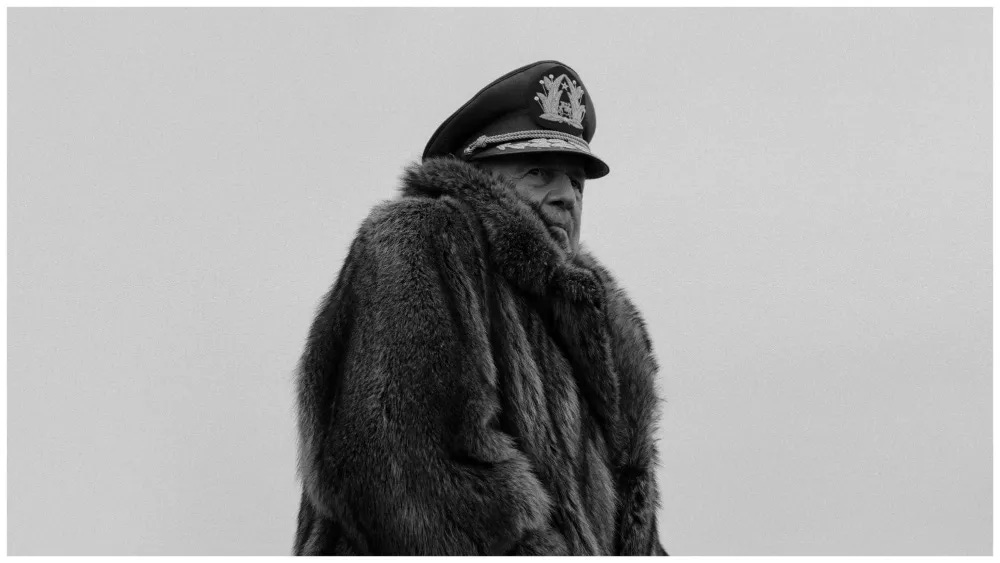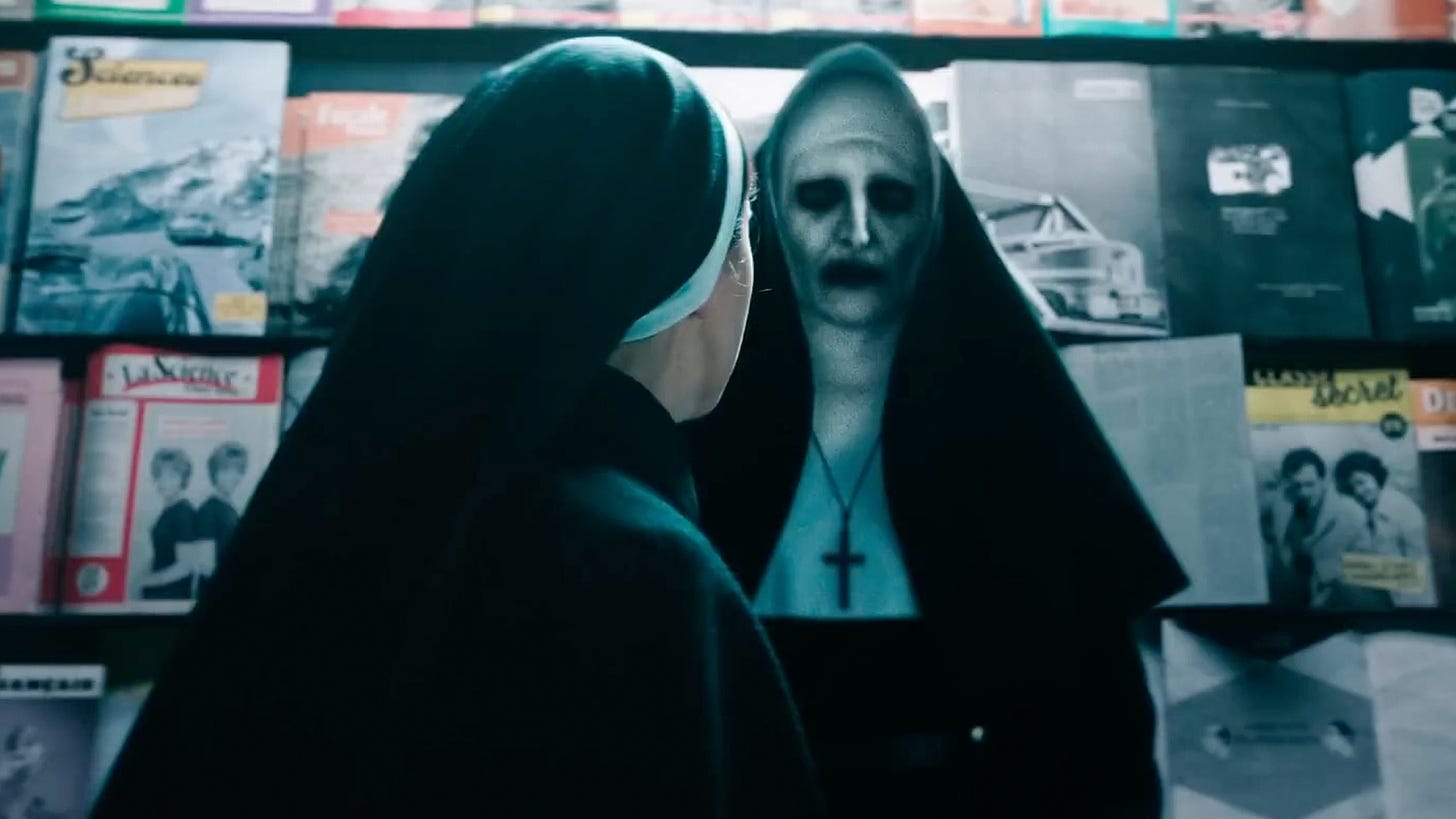In Review: 'El Conde,' 'The Nun II'
It's a week filled with vampires and demon nuns thanks to two films that use supernatural monsters in strikingly different ways.
El Conde
Dir. Pablo Larraín
111 min.
Fascism never dies, even after its regimes have toppled. Beyond the lingering stench of the landscape it scorches, there’s the constant threat of its return, when some toxic political alchemy summons it from the shadows. And so it seems inevitable that a filmmaker like Pablo Larraín, who has grappled with the fallout from Augusto Pinochet’s 17-year reign in Chile in films like Port Mortem and No, would connect this eternal evil with vampirism. His toothsome satire El Conde, which translates as “The Count,” imagines Pinochet as a 250-year-old vampire who’s been feasting on revolutionaries and the oppressed since the days of Louis XVI, with stops in Haiti, Russia, and Algeria before setting up shop in a South American country he could call his own.
Timed to the 50th anniversary of Pinochet’s dictatorship, El Conde may acknowledge the ever-present scourge of fascist thieves and killers, but it focuses on the aftermath of his reign, which wasn’t the reckoning he deserved. After a visually striking, ultra-violent and hilariously caustic prelude that traces Pinochet’s origins back to the French Revolution, when he took Marie Antoinette’s head as a souvenir and licked blood off the guillotine—fan culture was a problem in the late 18th century, too—Larraín settles closer to the present. Pinochet (Jamie Vadell) is a feeble old grump, angry that his immortality hasn’t outlasted the long memories of those who detest him. As he attempts to starve himself to death, his five vile adult children come sniffing around for their inheritance, which they believe is tucked away in a breadcrumb trail of documents that lead to various bank accounts in the Caribbean.
Meanwhile, other important figures in his life emerge, including his faithful butler Fyodor (Alfredo Castro), who ran his torture and “disappearance” program so ruthlessly that he bit him as a reward, and his exasperated wife (Gloria Münchmeyer), who has secret motives for keeping him alive. The fly in the ointment is an attractive nun (Paula Luchsinger) who the Catholic Church has dispatched to perform an exorcism on his soul, but appears under the cover of being an accountant. Her flirtations with Pinochet, made naughtier by her righteous intensity, give El Conde a pulpy nunsploitation quality that helps carry it through a middle section that sags in energy.
Much of mordant humor in El Conde comes courtesy of a mystery narrator, who describes the Allende-era General Pinochet as looking “like a pimp in the hide of a Banana Republic mafioso” and introduces Fyodor as “human pigswill” and “a Cossack forged of vodka and steel.” Pinochet’s failchildren are of a comically familiar vintage, too, none of them capable of surviving without the ill-gotten money their father has swiped from the national till. (“All generals who win wars have the right to pillage,” his wife explains.) They’re bummed by living in exile, but never feel shame about taking what’s theirs.
The film’s only persistent flaw is that Larraín’s conceit isn’t supported by a more purposeful story to keep the satire percolating. After coming out of the gate with such thrilling gusto, it sputters to life in fits and starts, depending on inspired scenes, lines or images that aren’t bound together by enough connective tissue. Still, it’s an unusually beautiful and evocative comedy, with Ed Lachman’s black-and-white cinematography oscillating between the grime of a morally diseased family and the silky silver of Pinochet taking flight toward Santiago over Chilean waterways and valleys. The old man may want to slip into obsolescence, but he cannot resist the taste of blood. — Scott Tobias
El Conde opens in limited theatrical release today. It premieres on Netflix September 15th.
The Nun II
Dir. Michael Chaves
110 min.
In the 2018 film The Nun, a demon named Valak comes this close to climbing through a rift separating Earth from Hell, located in a Romanian abbey damaged by bombs in World War II,by assuming the form of a creepy nun. And it would have gotten away with it if it weren’t for a meddling priest named Burke (Demián Bichir), an enterprising young novitiate named Irene (Taissa Farmiga), an itinerant French-Canadian jack-of-all-trades named Maurice (Jonas Bloquet), a vial containing the blood of Christ, and a lot of sticktoitiveness. An offshoot of the Conjuring Cinematic Universe, The Nun never strays too far from what made the films of the central series (and its other offshoots) work, delivering a higher class of jump scares surrounded by swooping camerawork, moody lighting and treating an essentially nonsensical plot with the gravest of seriousness. Anyone expecting The Nun II to depart radically from that approach will be gravely disappointed. But for those who’ve come to see the Conjuring-verse as the surest-bet horror franchise going, its familiarity should feel welcoming.
Set in the mid-1950s, a few years after the events of The Nun, this sequel finds Valak not only once again up to its old tricks but taking the act on the road. The film’s opening scene depicts some strange happenings in a church in Tarascon, France, a spot located (perhaps not so coincidentally) near a monastery-turned-boarding school where Maurice has taken a job as a handyman. Meanwhile, Irene has attempted to put the events of The Nun behind her, but her anonymity doesn’t prevent the Vatican from pulling her into its investigations of the Tarascon incident. (Burke, we’re informed, is unavailable after dying off screen. R.I.P.) As Irene picks up a high-spirited novitiate sidekick named Debra (Storm Reid) and Maurice befriends a teacher named Kate (Anna Popplewell) and her daughter Sophie (Katelyn Rose Downey), Valak makes new plans to climb out of Hell or, failing that, kill a few innocent schoolgirls and other passersby.
Of course, the problem with familiarity is that it’s, well, familiar. Valak’s evil nun form, with its tendency to blend into then emerge from shadows, remains creepy but, counting The Conjuring 2, this is the third time we’ve seen it. Fortunately director Michael Chaves (a Conjuring veteran thanks to the pretty good The Curse of La Llorona and the series-worst The Conjuring: The Devil Made Me Do It), working from a script by Ian Goldberg, Akeela Cooper, and Richard Naing, throws in a few surprises, including a new antagonist and an inventive sequence at a newsstand that’s better left unspoiled. But ultimately it’s the Conjuring-verse’s established elements that make it work, including a deadly earnestness about a universe with a clear division between good and evil, filled with angels and demons and pious protectors played by a fully committed cast. (Farmiga’s ability to convey concern and resolve in the face of supernatural threats rivals her sister Vera Farmiga’s work in the Conjuring mothership films.) It’s bread-and-butter horror, but who doesn’t want bread and butter once in a while? —Keith Phipps
The Nun II opens in theaters tonight.









(Burke, we’re informed, is unavailable after dying off screen after asking for a raise. R.I.P.)
SIDEBAR: I love these Conjuring-verse movies and while I understand that people hate the Warrens, that doesn't really take anything away from the movies IMO. They're pretty dang consistent with the best ones (first two Conjuring movies and Annabelle Comes Home) being really great.